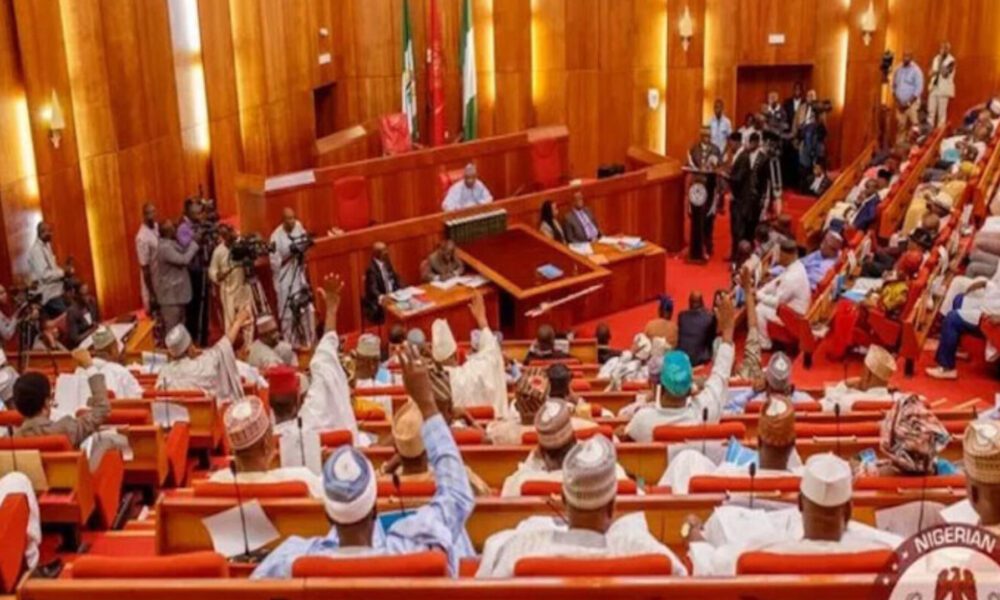***Discloses that Governors, Federal Lawmakers will share 2,800 trucks to farmers
**Food reserves in the country are empty, Ex Senate President alleges
Apparently worried by the state of the nation where inflation has eroded the purchasing power of Nigerians, the Senate has asked the Federal Government to without further delay address the issue of food insecurity and avert impending repercussion.

The Upper Legislative chamber also charged the government to adequately inform the general public on steps being taken to avoid negative reactions from the citizenry.
According to the red chamber it is expedient and instructive to do so to avert the wrath of the citizenry who are currently undergoing excruciating hunger and acute starvation in the country.
The red chamber equally raised the alarm that food crisis could be imminent in the country as the entire food reserves in the country are totally empty.
The President of the senate Godswll Akpabio however indicated government has embarked on measures to halt food crisis in the country.
The Senate resolution was sequel to a motion by the Senator representing Kogi West Senatorial District, Sunday Karimi, on the urgent need to address food insecurity and market exploitation of consumables in Nigeria.
Senators in their various contributions lamented the high cost of food in the country and urged the Federal Government to arrest the situation.
Akpabio asked the Chairman Senate Committee on Agriculture, Senator Salihu Mustapha to brief his colleagues on the issue of fertilizer distribution.
Mustapha said the Federal Government has decided to distribute to each state governor for onward distribution to farmers.
He also said each of the senators would distribute two trucks each while members of the House of Representatives would share one truck each to the farmers in their various constituencies.
Speaking further on the issue, Akpabio said, “irrespective of political party, each state governor is going to get at least 60 trucks immediately.
“The reason they are giving two trucks to each senators and one each to House of Representatives members is because some of the state governors and the lawmakers are not in the same political party.
“They (governors) may get and they may not really look at your constituents. So for some of you, it’s important that you also have something to share to your constituents. Your own will be two trucks.
House of Representatives members will get one.”
The Chief Whip, Ali Ndume, said credible global agencies had predicted acute foods and nutrition insecurity in the Sahel and West Africa, with particularly emphasis on Nigeria
He said, “Here in the North, we have started seeing it visibly. People are hungry, very, very hungry. Many cannot go to their farms. All of us know this. In the north central, the north east, and the north west.
“Even in the southeast, we still have crisis among the farmers and the herdsmen.
Even in the South West, we still have this crisis. As it is now, a bag of rice is selling at about N100,000. A bag of maize, the same thing. Even prices of tomatoes, onions, and other basic food is high.
“Distinguished colleagues, as representatives of the people, we need to do something. Or at least say something. That’s why I co-sponsored this motion. And I believe all of us here are concerned because we are talking to one another. Let’s do something.”
Senator Ahmed Wadada, representing Nassara West Senatorial District, said “the matter at hand is a very, very serious matter.”
Wadada said, “Nigerians are very patient people and very enduring people. But no people can be as that patient when they are hungry.
Former Senate President, Ahmad Lawan noted that there was a limit that a people could exercise patience and tolerance.
He said, “I have seen first hand, how people, especially those who are not in the civil service, nor in any business, are suffering, fighting, struggling to have food at least once in a day.
“This Senate must engage the executive immediately. We should be seeing to be doing the right thing. We have really little or nothing in our food reserve across the country. And nobody.
“If you come and tell us, they will distribute foodstuff from our silos. The silos are empty. So it means we have to import food. And if we have to import, it means we need foreign exchange. That is why we have to engage with administration.
“We are the most vulnerable in the leadership arrangements of this country. Everybody looks up to senators or members of the House of Representatives
“In fact, people see senators as their Messiah. Any problem, they say, go to your senator. So if we don’t take immediate action, we will lose the power.
“Our citizens under the situation of increased fuel price, increased electricity price, increased everything and we are yet to get the right measures to provide questions for our constituents.
“We wouldn’t like the kind of thing that we see in our streets and it is time that we take every possible action to ensure that food flood our country, the right food.
“On importation, government must be entirely responsible because we cannot, continue to take people for granted for too long. We have come almost to the end of their patience. I think the elasticity is now going to elapse if we are not careful.”
Senate President, Godswill Akpabio, while rounding off the debate, urged his colleagues to take advantage of the fertilizer distribution before the major rains ravage the situation.
He said, “So in your various senatorial districts, each senator would have 1,200 bags which would be given for immediate distribution across the senatorial districts.
He explained that the process of distribution was delayed because of security reasons,as they needed to be sure that the fertilizers would not enter into wrong hands.
Akpabio said, “For me I’m saying that this is an emergency. The food situation is an emergency. We must help our people.
“Part of it is also to make sure it’s not just providing food today. It being able to plant, to make sure that latest October, November, we have excess food in the market because Nigerians must feed. Everybody’s concerned.
“The primary role of government is to ensure the welfare and security of the citizens. That is the reason we are here.
“On the fertilizer distribution, just allow this weekend to pass, if you have not received it, or your contact persons have not received by this weekend, then you bring it up on Tuesday, and we know what to do.
“We may have to summon the Minister of Agriculture, the Governor of Central Bank, and all those involved to come before us, because we want to make sure that we leave this issue in the board. Like I said, it wasn’t caused by the current administration.”




